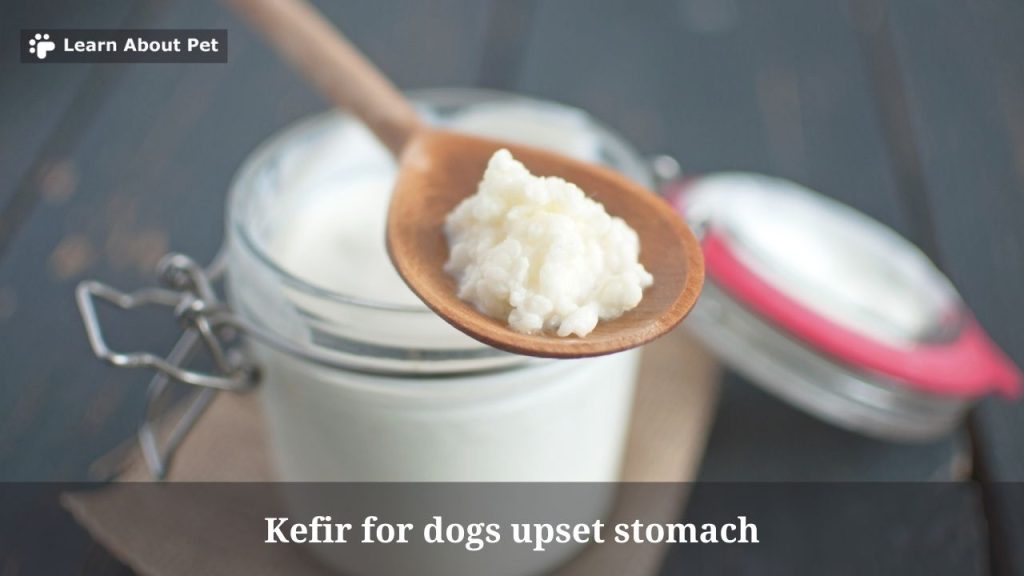Many dog owners express interest in knowing whether kefir can be helpful for dogs with stomach upsets. This article explores that subject comprehensively.
Using kefir for dogs upset stomach is a good idea. Kefir is rich in probiotics, which can be helpful to a dog with a stomach upset. You just need to ensure that the kefir you are using is of the unsweetened type.
If you happen to give your dog sweetened kefir, then it may worsen rather than improve the stomach upset.
It is also important for you to be sure that your dog is not lactose intolerant. If your dog is lactose intolerant, and you happen to give it ordinary milk kefir, then you may end up with a much worse stomach upset.

But there is coconut kefir for dogs that happen to be lactose intolerant.
Ultimately, going by kefir for dogs reviews, there seems to be agreement that kefir can offer some relief to dogs with stomach upsets.
Kefir for dog stomach upset works by providing the dog with probiotics, which aid in digestion.
But before going further with this discussion on the use of kefir for dogs upset stomach, we first need to know what exactly kefir is.
After that, we can revert to the subject of using kefir for dogs upset stomach.
What Exactly Is Kefir?
We can best describe kefir as a form of fermented milk drink, which comes into being when kefir grains are added to milk.
The kefir grains in question are, in actual fact, yeast and bacteria colonies, in granular form. So these are not ordinary cereal plant grains.
Now what makers of kefir drink do is simply introduce those grains into milk. The milk then ferments in a special way, giving rise to the sour drink that looks like thin yogurt, and which we refer to as ‘kefir’.
With this basic understanding of what kefir is, we can now proceed with the discussion on the use of kefir for dogs upset stomach.
In that regard, we will start by finding out whether kefir is safe for dogs. We will then seek to know whether kefir is good for dogs, and what exactly kefir does for dogs.
Once we get that background information, we will be able to see how the use of kefir for upset stomach would make sense.
Is Kefir Safe For Dogs?
Before even thinking of using kefir for dogs upset stomach, you first need to be sure that kefir is safe for the dogs.
So is kefir safe for dogs? Can I give my dog kefir without worrying about safety? Can dogs eat kefir safely?
The true position is that kefir is safe for dogs. That is provided the kefir in question is unsweetened. And that is also provided that the dogs don’t have lactose intolerance.
If a dog is lactose intolerant, there is coconut/water kefir that can be helpful to it.
Thus as long as the kefir dog consumes is unsweetened, it should be safe.
And if you had the can dogs have kefir safely question, now you know that the answer is ‘yes’. For dogs kefir is largely safe. It can only be unsafe if it is sweetened.
But if the kefir dogs consume is bland (unsweetened), then it is alright.
Yet you may find someone asking, can kefir make my dog sick? For instance, can kefir cause diarrhea in dogs? Does kefir cause upset stomach in dogs?
And the answer is that if you give your dog sweetened kefir, then it can actually make the dog sick. This is in spite of the kefir being generally safe for dogs.
Similarly, if your dog is lactose intolerant, and you give it ordinary milk kefir (rather than coconut kefir), then that can make it sick. And this is in spite of the kefir being generally safe for dogs.
Thus the answer to the is kefir healthy for dogs question is ‘yes’. But there are cases in which it can be unhealthy.
When thinking of giving kefir to dogs, it is important to have awareness of these facts.
Is Kefir Good For Dogs?
Before using kefir for dogs upset stomach, you will probably want to know whether kefir is good for dogs generally.
So, to personalize the question, is kefir good for my dog?
The simple answer is ‘yes’. Kefir is good for a dog.
Most of the benefits of kefir for dogs are based on two facts. First is the fact that kefir comes from milk, and milk is good for dogs.
And second is the fact that kefir is rich in probiotics, and these are useful to dogs.
Thus kefir yogurt for dogs is good to that extent.
There are specific situations in which kefir can be particularly helpful to dogs.
If, for instance, you research on is kefir good for dogs with pancreatitis, you will find hints in that direction.
You see a similar trend if you research on is kefir good for dogs with allergies.
But our focus here is specifically on this question: is kefir good for upset stomach? Like, to be even more specific, is kefir good for diarrhea that is due to upset stomach in dogs?
Does kefir help upset stomach in dogs?
And the answer is ‘yes’. To the extent that it is rich in probiotics, kefir is good for upset stomach.
So this richness in probiotics is, for instance, what makes kefir good for diarrhea that is due to stomach upset.
At a general level, if you had the can you give kefir to dogs question, now you know that the answer is ‘yes’. You can give kefir to dogs. Kefir is good to dogs.
Kefir for dogs has lots of benefits. Kefir for dogs can provide useful nutrients, while also giving relief from certain ailments.
What Does Kefir Do For Dogs?
If you are considering using kefir for dogs upset stomach, you may want to know what kefir does for dogs in the first place.
Now there are lots of things that kefir does for dogs. But we will pinpoint two.
Firstly, kefir provides dogs with nutrients they need. This is because kefir comes from milk. And milk is nutritious to dogs.
Secondly, kefir provides dogs with probiotics. These can help dogs with digestion, while also providing relief from stomach upsets and other problems of that nature.
Indeed, if you research on what soothes an upset stomach in dogs, you notice that kefir is one of the top things.
So what kefir does for dogs is provide them with nutrients (since it is basically milk) and probiotics.
Can You Use Kefir For Dogs Upset Stomach?
Kefir can be helpful to a dog with a stomach upset. Thus the use of kefir for dogs upset stomach is beneficial.
Kefir is made by adding granular yeast and bacteria colonies (the kefir grains) to milk.
Thanks to the fact that it comes from fermented milk, yeast and bacteria, kefir turns out to be rich in probiotics.
And probiotics are helpful to a dog with an upset stomach.
So it is against this background that the use of kefir for dogs upset stomach makes sense.
Often, dog stomach upset manifest through diarrhea. You thus find someone asking, will kefir cause diarrhea that is due to stomach upset to cease? Does kefir stop diarrhea generally?
And the answer is that kefir is able to relieve stomach upset symptoms: including the diarrhea.
The diarrhea kefir stops is that which is due to stomach upset, and a few other causes.
The kefir diarrhea relieving capability is largely as a result of it being rich in probiotics.
But then again, if you use the wrong type of kefir, you can end up worsening rather than improving the stomach upset.
For instance, using blueberry kefir for dogs may possibly be harmful, if it happens to be sweetened.
Thus the best kefir for dogs upset stomach is that which is plain: that is, unsweetened.
Otherwise you may give a dog kefir and diarrhea problem worsens.
You also need to give your dog the kefir in moderation.
Just research on what happens if dogs eat too much kefir. You see that stomach upset is one possibility.
Thus if you give your dog too much kefir, it may worsen rather than improve the stomach upset.

Kefir For Dogs Upset Stomach – How Does It Work?
When a dog takes kefir, it is essentially consuming probiotics. That is because kefir is rich in probiotics.
It is the probiotics in the kefir that help soothe the dogs upset stomach.
Among other things, the probiotics help with digestion, which in turn translates into relief from stomach upset.
So the kefir milk dogs consume gives them supplemental probiotics. Those then soothe the dog’s stomach upset symptoms.
More specifically, you can have kefir help diarrhea that is due to stomach upset via this mechanism.
But it is worth understanding that the relationship between kefir and dogs stomach upsets is complex. There are cases in which kefir can worsen, rather than improve the stomach upsets.
For instance, if a dog takes sweetened kefir, it may make the stomach upset problem worse. One may ask how that is possible. After all, we have just said that the kefir is rich in probiotics.
How can probiotics upset a dog’s stomach (contrary to what we have just said earlier)?
But what you come to learn is that when you give a dog sweetened kefir, what worsens its stomach upset is not the probiotics in the kefir. Rather it is the sugar used in sweetening the kefir that worsens the stomach upset.
Thus if, for instance, you are using kefir for diarrhea in dogs that is due to stomach upset, you better be sure that the kefir in question is unsweetened.
Using Ordinary Milk Kefir For Dogs Upset Stomach
If your dog is not intolerant to lactose, it may be a good idea to give it ordinary milk kefir.
Besides providing the dog with relief from stomach upset, this ordinary fermented milk kefir will also provide the dog with nutrients it needs.
Thus unless your dog is lactose intolerant, ordinary (unsweetened) milk kefir may be what is best.
Using Coconut Kefir For Dogs Upset Stomach
In case your dog is intolerant to lactose, you shouldn’t give it ordinary milk kefir to relieve stomach upset. You will only end up making it worse.
In this case, in which your dog is lactose intolerant, what you need to give is coconut kefir.
Coconut kefir for dogs upset stomach is effective, but without the lactose intolerance issues.
How Much Kefir For Dogs Upset Stomach?
Having learnt that kefir is good for dogs with stomach upsets, the question that follows is on how much kefir the dogs can have.
Ideally, a small dog should have only 1 teaspoonful of kefir. A medium size dog can have 1-2 teaspoons, whereas a big dog can have 2-3 teaspoons.
But you need to introduce the kefir to the dog gradually.
So you may start with just a half teaspoonful, before going to the 1-3 teaspoonful range we have given above.
That is how much kefir to give dog.
If you go through the various kefir for dogs how much Reddit threads, these are the figures you are likely to find.
And if you had the how much kefir do I give my dog question, that is the answer to it.
While at it, one may ask, can you give dogs kefir every day? And if yes, how much kefir should I give my dog daily?
The answer is that kefir is one of those foods that dogs can have daily: but with moderation.
This then leads to another question on how to stop dog from overeating kefir?
And the answer is by sticking to the guidelines we gave above, while answering the how much kefir to give my dog question.
So that is 1 teaspoon for a small dog, max 2 teaspoons for a medium size dog and max 3 teaspoons for a big dog.
Final Verdict – Kefir For Dogs Upset Stomach
For dogs with stomach upset problems, kefir can offer considerable relief.
Kefir is rich in probiotics and it is these that can be helpful to a dog that has stomach upset problems.

You only need to ensure that the kefir you give to a dog is unsweetened. Sweetened kefir can aggravate rather than improve the stomach upset problem.
If you are giving a dog kefir for stomach upset problems, you need to give it in moderation.
That should ideally be a maximum of 1 teaspoonful for a small dog, maximum 2 teaspoonfuls for a medium size dog and maximum 3 teaspoonfuls for a large dog.
As a pet lover, make sure to learn about pet more and give your pet dog a good and comfortable life!

Welcome to Learn About Pet. My name is Rajkumar Ravichandran and I love all pets, travel, and amazing food. I write about my passion and personal experience caring for multiple pets in this blog! ❤️
Post Disclaimer
DISCLAIMER: THIS BLOG OR WEBSITE, "Learn About Pet", DOES NOT PROVIDE YOU WITH MEDICAL ADVICE AND IS NOT A SUBSTITUTE FOR MEDICAL ADVICE. ALWAYS GET IN TOUCH WITH YOUR PERSONAL VETERINARIAN AND USE INFORMATION HERE AS GENERAL ADVICE.
The information, including but not limited to, text, graphics, images and other material contained on this website are for informational purposes only. No material on this site is intended to be a substitute for professional veterinary advice, food recommendation, diagnosis, or treatment. Always seek the advice of your veterinarian or other qualified health care provider with any questions you may have regarding a medical condition or for pet food related questions.







